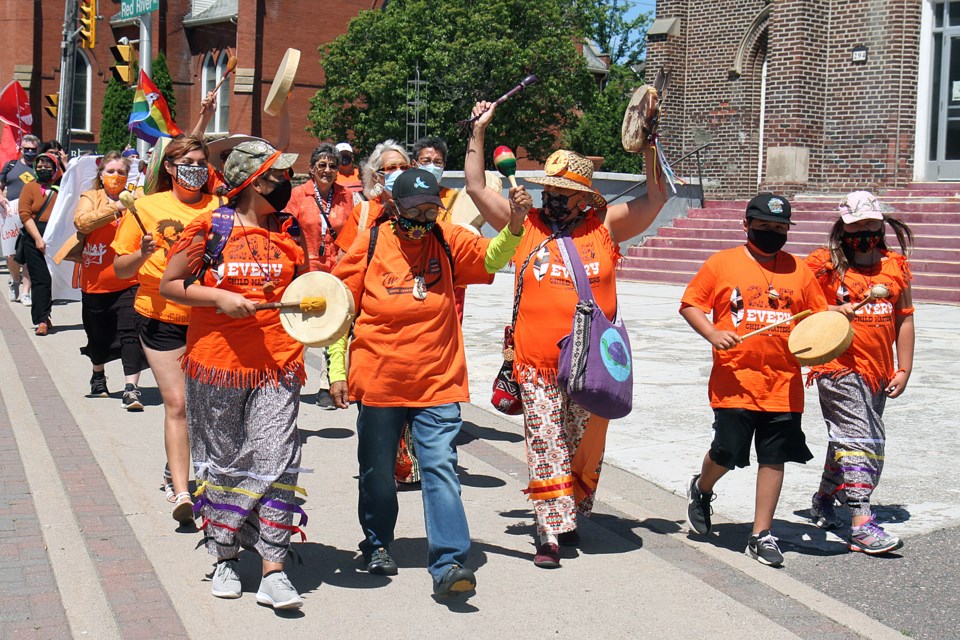THUNDER BAY – The City of Thunder Bay has scaled back its 2022 Canada Day celebrations and launched discussions over how to handle the occasion going forward, after the discovery of unmarked graves at residential schools forced a reckoning over the holiday last year.
The city’s supervisor of cultural development and events, Louisa Costanzo, advised city council in a memo of ongoing discussions over how the city can re-envision its programming “to reflect and recognize that Canada Day means something different to everyone, and to move forward in an inclusive, thoughtful, and meaningful way towards Reconciliation.”
The process will include discussions at the city’s elders’ council and with community partners. Those discussions will be sensitive and take time, city staff said, meaning a plan will be brought to city council for implementation in 2023.
In the meantime, the city will offer a smaller version of its traditional waterfront Canada Day celebrations in 2022, ditching its usual fireworks show (the show will instead be added to a Live on the Waterfront concert event later in the summer).
“For this year, we’ll be scaling back the event,” Costanzo told council at a meeting Monday. “The event will include a stage show, food vendors, and community groups, similar to previous years. The opening ceremony will include a land acknowledgement and an invite for participation of an elder to provide an opening prayer, as well as Indigenous dancers and drummers.”
The city will also explore adding “learning opportunities, messaging, and Indigenous content.”
Last year, in the wake of the discovery of hundreds of unmarked graves at multiple residential school sites, about 450 local residents traded in red and white for orange, joining a “cancel Canada Day” rally, one of many similar events held across the country.
The city offered only virtual Canada Day programming, citing the discovery of unmarked graves as well as the pandemic.
It’s a decision Fort William First Nation Chief Peter Collins welcomed at the time, saying, “We have nothing to celebrate with Canada on July 1.”
The First Nation moved its own traditional Canada Day fireworks display to take place several days later.
Just how the day should be marked going forward still requires discussion, but it’s clear the city can’t ignore the question, said Tanis Thompson, manager of Indigenous relations with the city.
“It really is evident [with] what’s happening across our country with the rediscovery of the graves, the pope’s recent apology, it’s time to truly recognize these hard truths,” she said. “These truths that have been revealed and will be continually revealed, it’s opened that door to the next steps in the healing journey for Indigenous community members, but [also] non-Indigenous community members who may be hearing about these tragic truths for the first time. There’s still a long, long road toward true reconciliation.”
It’s a conversation she acknowledged is likely to be fraught, dredging up trauma for many Indigenous people, and challenging non-Indigenous Canadians' conceptions of their country and themselves.
The city is far from alone in reconsidering if Canada Day should be an occasion for celebration, said Costanzo.
“I think throughout the country, these conversations are happening and changes are being made, so we’re right in line with what’s going on,” she said. “No one really has all the answers, because it’s a discussion that needs to be had… I think everyone’s just in a learning process – we’re trying to figure out the next steps, looking at making some changes and… acknowledging and taking this opportunity to learn and listen, I think that’s really the big thing.”
The re-evaluation of Canada Day is part of the country's much larger process of truth and reconciliation, said Lakehead University history professor Nathan Hatton.
Indigenous peoples have historically been excluded from Canada Day celebrations, he said, with the nation defining itself in its early days as bi-cultural. Even as it reconceptualised itself as a multicultural nation, that often didn't include a real recognition of Canada's colonial legacy or the role of Indigenous peoples in its history, he said.
When Indigenous peoples have been included in celebrations of Canada, he said, they're too often "historicized," portrayed as part of the country's past, “as opposed to a living, breathing people in the present.”
The city will consider striking a working group on how to approach future Canada Day events. The issue has been brought to the elders’ council for preliminary discussion, an experience Thompson said showed there’s no clear consensus among Indigenous people or communities.
“There were several different opinions, and personal approaches to how each elder on our council observes this day,” she said. “Some choose to not even participate. When you’re looking from an Indigenous lens, it’s like, why would I celebrate when settlers came in and colonized our country to make it Canada?”
